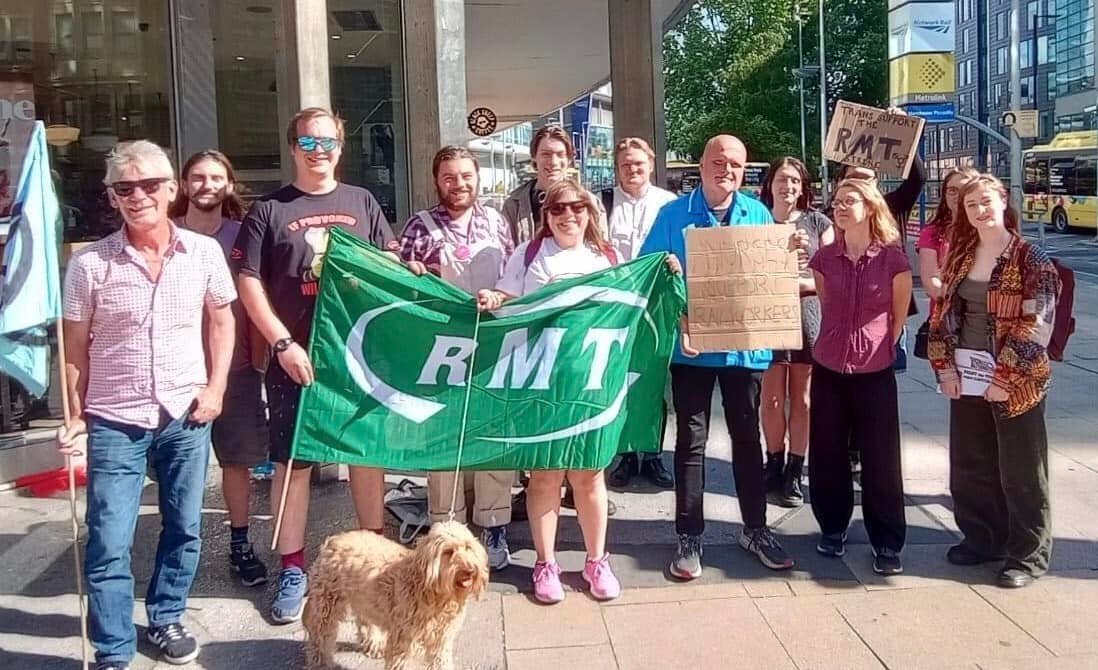By Finghín Kelly
The power held by working-class people when acting collectively was strongly shown this week in Britain with the strike across the railway network by RMT union members.
The strike was the largest on the railways in Britain since 1989. It brought the railways to a complete halt and had knock-on impacts in other sectors.
At the time of publication, the strike has had three one-day actions. Reports indicate that the strike is solid and there is active participation of workers on the pickets and at rallies. There was a massive ballot for the strike action among the workers with a nine-to-one vote in favour of strike action.
Fighting the bosses’ attacks
The strike was called in response to significant attacks by the railway companies. They include a slashing of 2,500 jobs at Network Rail as well as attacks on pay and condition across 15 different railway operators. These attacks are being backed by the British government which as the RMT general secretary, Mick Lynch, has pointed out is very much part of the dispute and is acting to push a tough line from the bosses. Boris Johnson and the Tories are intent on striking a blow to a powerful and well-organised group of workers.
An interesting feature of the dispute is how Mick Lynch has become a viral social media sensation – even spurring a flurry of memes and support from unlikely sources. This is down to his firm defence of the industrial action being taken by members of the RMT. It certainly will not be lost on workers in Ireland the stark contrast between the stance Lynch has taken in the last week and the craven ineptitude of the trade union leadership here in Ireland, particularly in the South, in the face of the cost of living crisis. Instead of engaging in a decisive struggle, they are looking to engage in a new partnership agreement with the bosses and the government that represents them.
The media in Britain has tried to portray the strike and the workers’ cause as unpopular, and have cynically intervened in a conscious effort to divide the general public from the rail workers. Tory backbench MPs and leading people from Starmer’s Labour Party (who Starmer has instructed not to show support for pickets) have been lining up as attack dogs in studios. Lynch, instead of caving to this media pressure, has launched a defence of trade union traditions such as active pickets to stop scabs undermining the action. Footage of him doing this under attack from right-wing hacks with ludicrous arguments such as Kay Burley, Piers Morgan and Richard Madeley have gone viral.
Support for the strike
Despite the media attacks the strike has strong support. A poll taken by Savanta ComRes has shown that 58% of the public see the strike as justified.
This should be no surprise, despite what the media and political establishment – and also many conservative trade union leaders – like to push. Strikes and workers taking action if well organised, and armed with a strategy to win over support from the wider working class can be hugely popular and can also convert this into active support.
It is especially the case in this strike where transport workers have been on the front lines during the pandemic. RMT members kept transport going, ensuring essential workers and others were safely brought to and from work during the pandemic. Often putting their own lives and health in danger, transport workers are among occupations with higher rates of Covid deaths and infection. There is also a strong understanding in Britain of how privatisation of the railways has been an utter disaster for workers, communities depending on rail connections and passengers generally.
Cost of living crisis
This strike is also taking place in the context of a cost of living crisis. Inflation is at 9.1% in Britain – the highest in 40 years. This is hitting low and middle-income workers hardest and is happening on the back of stagnating and declining wages for decades of Tory and Blairite anti-worker policies. The idea of taking industrial action to defend pay and conditions and to counter inflation can strike a strong chord with workers and poor people across Britain. The support for the strike and for Mick Lynch’s stances in the media is showing this.
To keep up the pressure on the bosses and the British government, RMT workers should now discuss across the union about how they can escalate the action, including announcing more strike days, and looking at how they can broaden and activate the support they have among working-class people.
Putting down a marker
Workers in other sectors and other unions should look at how they can take similar action, and coordinated as much as possible with the RMT’s actions. This would put even more pressure on the railway companies, the government and employers in general. This is the programme and strategy being put forward by Socialist Alternative, our sister organisation in England, Wales and Scotland, which has also called for the rail industry to be nationalised under democratic workers’ control and management.
The strike is putting down a certain marker and giving an example of how to fight back and how workers can deal with the cost of living crisis. It is therefore rich in lessons for workers in Ireland and internationally. Workers here have massive power too and can win support and victories with a fighting strategy that boldly takes on employers and the government. Workers looking at how to respond to the cost of living crisis should take note.











